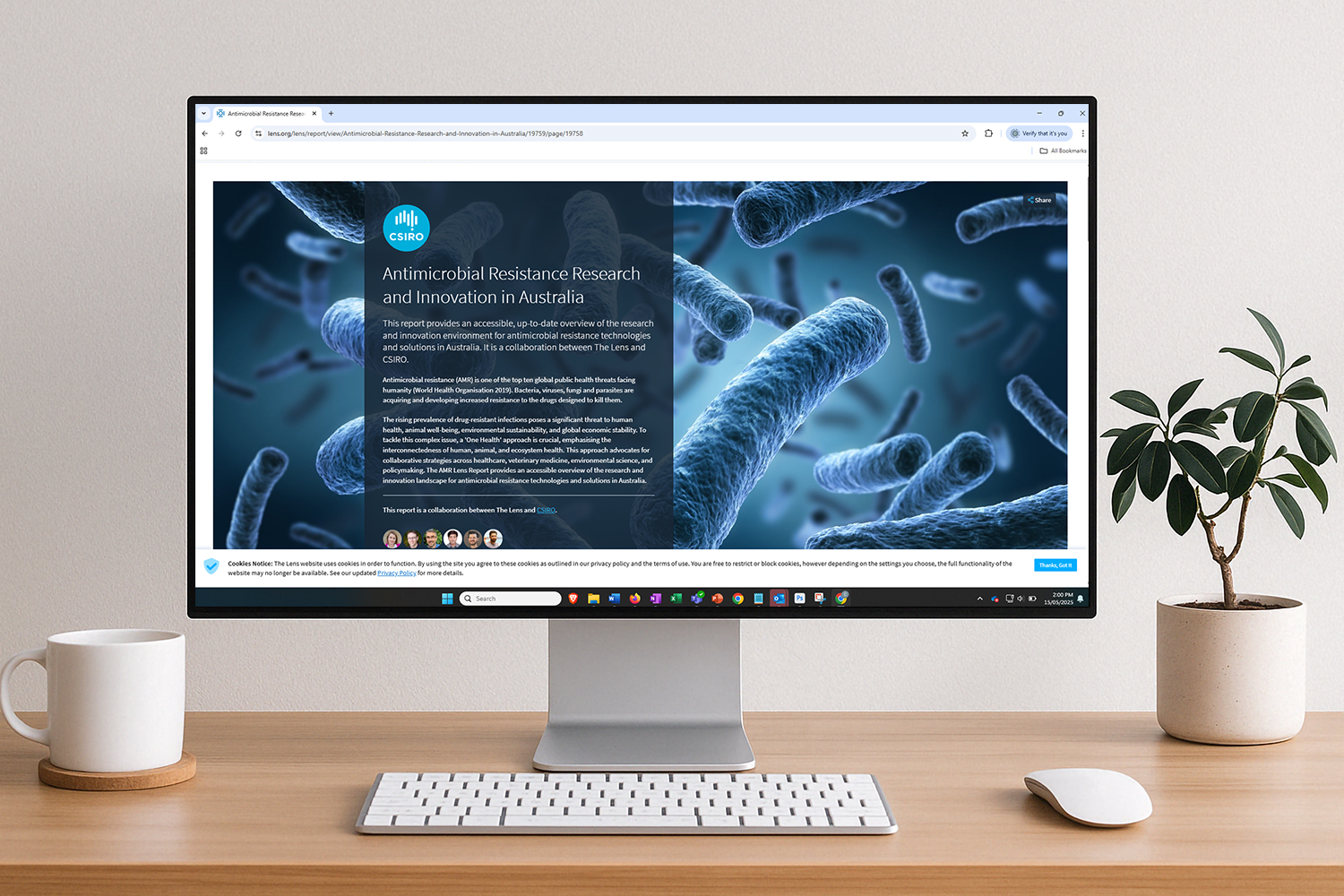A new resource launched today provides real-time, data-driven insights into Australia's antimicrobial resistance (AMR) research and patent landscape to help address key challenges in the AMR space.
The report, Antimicrobial Resistance Research and Innovation in Australia, was developed through a collaboration between The Lens and Australia's national science agency, CSIRO.
The Lens, a user-supported platform created by the Australian non-profit Cambia, gathers, combines, and connects authoritative global sources of open scientific and innovation knowledge. This allows for better discovery, exploration, analysis, decision-making, and the targeting of partnerships.
This report was produced as part of Minimising Antimicrobial Resistance, a collaborative effort led by CSIRO, co-created with the Australian Government Department of Agriculture, Fisheries and Forestry, and the Department of Health and Aged Care.

Through The Lens platform, the report offers an unprecedented view of Australia's AMR research and patent landscape.
AMR occurs when disease-causing microbes evolve to resist the effects of medicines, such as antibiotics, designed to kill them. This global problem makes infections harder to treat and is accelerated by the inappropriate use (overuse, underuse and misuse) of antimicrobials in humans and animals.
More than 1600 people in Australia die each year from an AMR infection. Globally, AMR is directly responsible for 1.27 million deaths.
These numbers are increasing.
Dr Richard Jefferson, CEO of The Lens, highlighted Australia's vital contributions to AMR research.
"Our research publications in AMR have surged from 52 in 1980 to a high of over 2,100 in 2022, and a remarkable 10 per cent of Australian scholarly works are cited in patents, demonstrating the strong translation of research into innovation," Dr Jefferson said.
"AMR is a global threat, and solutions will require international cooperation."
While Australia has made great strides, the interconnected and interdependent world of AMR requires us to view our efforts in a global context," Dr Jefferson said.
Professor Branwen Morgan, Lead of Minimising Antimicrobial Resistance at CSIRO, said the project will help connect the dots across Australia's AMR ecosystem.
This platform addresses critical challenges like fragmentation and limited collaboration by providing clear, accessible data.
"By providing an up-to-date picture of the researchers and innovators working in the space, we can drive interdisciplinary approaches and translate research into real-world solutions," Professor Morgan said.
Dr Jefferson emphasised the platform's unique ability to reveal connections between diverse research fields, and between public research and innovative enterprise.
"With the unprecedented chaos and uncertainty in biomedicine and public health today, it's vital that civil society, scientists, businesses and policy makers have access to trusted tools.
"These resources will empower them to build partnerships based on credible evidence, allowing them create solutions for the global public good," Dr Jefferson said.
The full report is available via The Lens.
A new resource launched today provides real-time, data-driven insights into Australia's antimicrobial resistance (AMR) research and patent landscape to help address key challenges in the AMR space.
The report, Antimicrobial Resistance Research and Innovation in Australia, was developed through a collaboration between The Lens and Australia's national science agency, CSIRO.
The Lens, a user-supported platform created by the Australian non-profit Cambia, gathers, combines, and connects authoritative global sources of open scientific and innovation knowledge. This allows for better discovery, exploration, analysis, decision-making, and the targeting of partnerships.
This report was produced as part of Minimising Antimicrobial Resistance, a collaborative effort led by CSIRO, co-created with the Australian Government Department of Agriculture, Fisheries and Forestry, and the Department of Health and Aged Care.
Through The Lens platform, the report offers an unprecedented view of Australia's AMR research and patent landscape.
AMR occurs when disease-causing microbes evolve to resist the effects of medicines, such as antibiotics, designed to kill them. This global problem makes infections harder to treat and is accelerated by the inappropriate use (overuse, underuse and misuse) of antimicrobials in humans and animals.
More than 1600 people in Australia die each year from an AMR infection. Globally, AMR is directly responsible for 1.27 million deaths.
These numbers are increasing.
Dr Richard Jefferson, CEO of The Lens, highlighted Australia's vital contributions to AMR research.
"Our research publications in AMR have surged from 52 in 1980 to a high of over 2,100 in 2022, and a remarkable 10 per cent of Australian scholarly works are cited in patents, demonstrating the strong translation of research into innovation," Dr Jefferson said.
"AMR is a global threat, and solutions will require international cooperation."
While Australia has made great strides, the interconnected and interdependent world of AMR requires us to view our efforts in a global context," Dr Jefferson said.
Professor Branwen Morgan, Lead of Minimising Antimicrobial Resistance at CSIRO, said the project will help connect the dots across Australia's AMR ecosystem.
This platform addresses critical challenges like fragmentation and limited collaboration by providing clear, accessible data.
"By providing an up-to-date picture of the researchers and innovators working in the space, we can drive interdisciplinary approaches and translate research into real-world solutions," Professor Morgan said.
Dr Jefferson emphasised the platform's unique ability to reveal connections between diverse research fields, and between public research and innovative enterprise.
"With the unprecedented chaos and uncertainty in biomedicine and public health today, it's vital that civil society, scientists, businesses and policy makers have access to trusted tools.
"These resources will empower them to build partnerships based on credible evidence, allowing them create solutions for the global public good," Dr Jefferson said.
